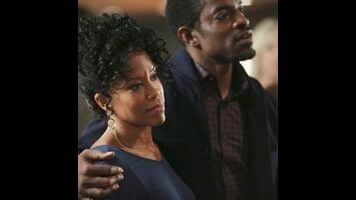Is “too bleak” enough of a reason to dislike a series, or to check out of it early? If there has been any general consensus across the board of critics and viewers, it’s that American Crime—both its surprisingly stellar first season and its current, even better second season—is too bleak, too serious, and utterly humorless. I don’t necessarily disagree with this assessment because American Crime certainly is all of those things and even I temporarily stopped watching in the middle of last season for a few months before eventually returning to it. But it’s important to remember that “bleak” and “good” are not mutually exclusive (The Leftovers!), and that American Crime excels even when—especially when—it’s dark and hard to watch. Based on the season two premiere, it’s just going to get darker.
After a school meeting in which Taylor is suspended for violating the code of conduct based on the photos, Anne tries and fails to get information from her son about what happened. Instead, she goes to Evy, Taylor’s girlfriend and a fellow partygoer, to see the pictures for herself. What follows is an emotional scene—there really isn’t any other kind of scene in American Crime, huh?—between the family as Anne confronts Taylor and Taylor chokes out, “Someone did something to me.” It’s telling that Taylor doesn’t use words like “rape” or “assault,” not just because he’s not sure exactly what occurred during the party but also because he is, like so many male teens (especially in towns, cultures, and/or schools that overvalue masculinity and athleticism), likely of the opinion that men can’t get raped, so how does he put something unthinkable and (according to some people) impossible into words? He doesn’t.
But let’s rewind a bit to the underlying themes that are abundant in the premiere episode. As expected, there is a heavy dose of race and class already being explored here. Taylor is a scholarship kid, someone attending a fancy private school on financial aid, a school where his classmates refer to him as “white trash” and where he’s resigned himself to the fact that he can’t afford college. Evy attends a different school, and explicitly mentions the economic disparity between the students at their two schools; while at the party, other girls mock and judge her cracked smartphone (because the easiest way for a series to let you know that a character is poor is by cracking their phone’s screen). Kevin, presumably one of the accused boys on the basketball team, and his family (including his mother Terri and his father Michael, played by the mismatched acting talents of Regina King and André Benjamin) tackle more internal racial issues, especially surrounding the girls that Kevin dates and the necessity for Kevin to be the best (a nice representation of the ‘you have to be twice as good’ adage). Then there is the school itself: Headmaster Leslie (Felicity Huffman, keeping her role as the immediately-unlikable character) is heading up a much-publicized fundraising campaign for more money, which turns this crime of rape into a unfortunately timed scandal in Leslie’s eyes.
The standout scene tonight (aside from Anne and Taylor) is between Anne and Leslie. Lili Taylor and Felicity Huffman both act the hell out of the scene—Taylor portraying the increasingly upset and openly emotional mother while Huffman plays the stern, faux-polite, and cool-as-a-cucumber headmaster—and sets up some of the challenges and arguments we’re going to see thoroughly investigated throughout the season. Anne wants justice and to punish the boys who did this to her son whereas Leslie is primarily concerned with protecting the school’s reputation. Leslie urges Anne to keep this confidential, she has her sign a statement, and she throws around statements like “make better choices” and “falsely accuse other young men.” At the peak of their meeting, when Anne straight-up says that her son was raped, Leslie coldly replies, “You need to be very careful with that word.”
That leads us back full circle: A return to the 911 call that began the hour, that yanked us into the season and introduced just how bleak it’s going to be. It’s an admirable premiere—one that’s essentially a pilot episode—that promises to be as (if not more) intense and twisty as the previous season. Sure, here are so many ways in which the season could go wrong, so many ways it can screw up the gender-flipped rape case, and so many ways in which it could prove to be an ultimately pointless exercise in television. Based on this first installment, however, I’m going in with high hopes.
Stray observations
- “It’s what he didn’t say … things he couldn’t talk about.”
- I’m very wary of the switch to a male victim, especially if it’s going to explore this through a lens of homosexuality as well. That said, I do commend the John Ridley for making this switch, as it seems to be actively destroying the false notion that “men can’t get raped” and because it’s certainly something that isn’t often depicted on television (save for a stray SVU episode here and there).
- The acting in American Crime remains superb.
- There are some things that came off as a little too easy/lazy in terms of writing (a young boy looking at a picture of a girl on his phone and stating, “I so wanna rape that”) but was made up for the effortless ways in which Ridley spoke volumes about a character in just a few seconds (Terri’s disapproval when Kevin passed to a teammate rather than making the shot).
- Hey everyone.

